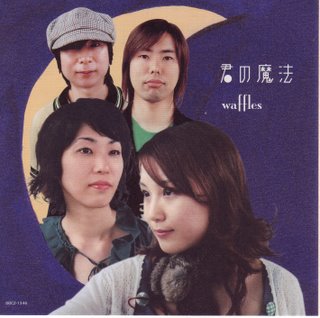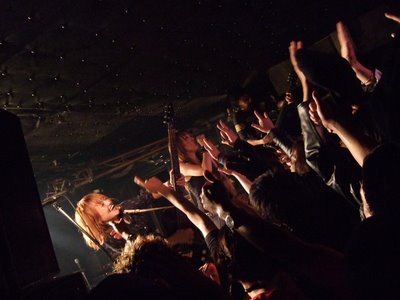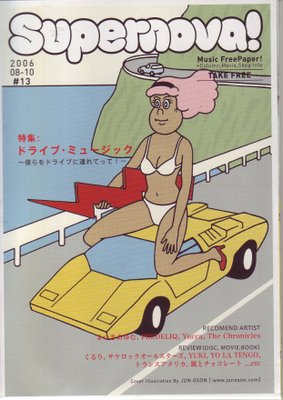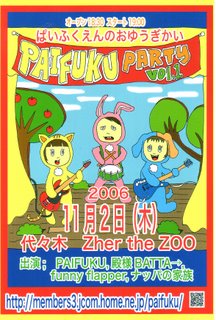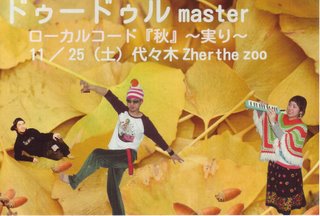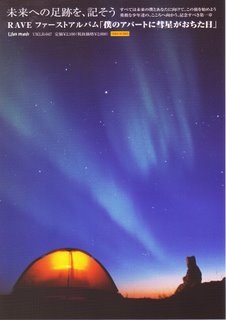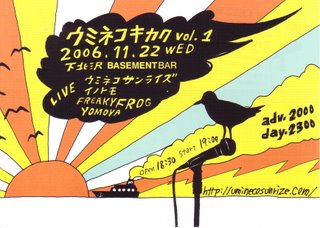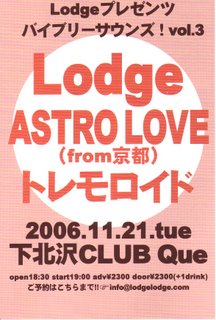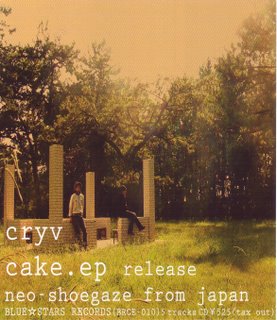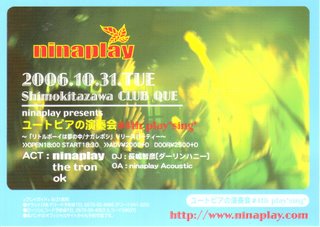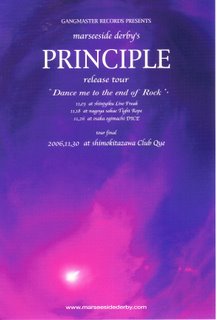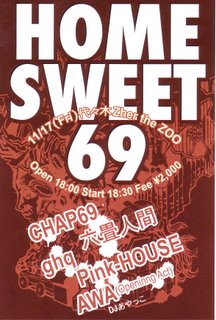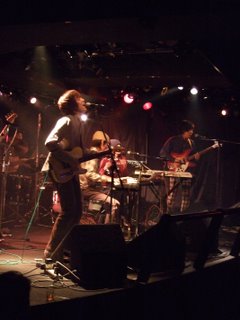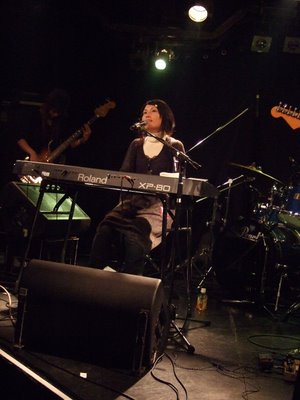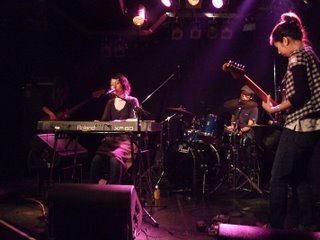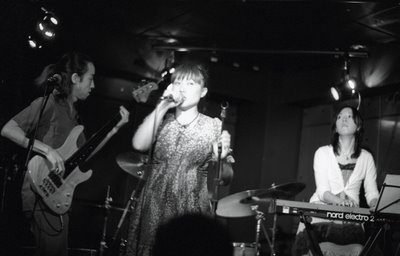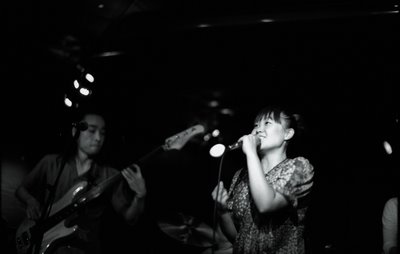
I organized a music event in Tokyo and, without intending to, seemed to have transported the spirit of an American gig into a Japanese club. It wasn’t like a normal Japanese show, where even punk audiences have been known to be as quiet and well behaved as those at a classical concert. My guys were there to party. A gang of gaijin inebriates took over the rear area next to the bar and held shouted conversations about every subject under the sun, except about the music that was playing in front of them. The Japanese closest to them were annoyed about the ruckus but also looked resigned to the fact that
that’s just the way foreigners are. And several of the foreigners, for their part, told me later that they loved the music, and I took their word for it.
I wanted to make the event on Saturday night, the first installment of
Japan Live Presents (produced together with Philipp Potz), freer and more relaxed than a typical Japanese show, and I think I succeeded. Guests could move in and out of the show at a bar called
The Baron, so they could step out to the streets of Nishi-Azabu and Roppongi if they wanted during the gig and come back later. In Japanese events, you usually can’t get back in once you leave. Parents brought their children and sat together in front of the stage—something you don’t see that often at Tokyo gigs. And if people wanted to talk rather than listen raptly to the music, that was fine too.
But music was the key ingredient of the event, and while maybe I shouldn’t sing the praise of the bands too much considering I invited them all myself, still I have to say all their performances were dazzling. If I was there as a regular member of the audience I would have loved the evening too. After all, the three groups,
Three Berry Icecream,
Yunn & Yuyake Lamp and
4 Bonjour’s Parties, are among my favorite bands. And I’m also a big fan of
DJ Kamaage, who spun records between sets.
 Three Berry Icecream
Three Berry Icecream, the musical unit of former Bridge member
Mayumi Ikemizu, played first. At gigs Ikemizu invites friends to perform, and these pals are also great, veteran musicians—at
Japan Live Presents the six-person band included the leader of
Little Lounge Little Twinkle, the keyboardist for
Orangenoise Shortcut and the violist who once played in Rocky Chack’s
Mori-No-Orchestra. Three Berry Icecream, as the name suggests, plays sweet, happy pop songs, but their orchestration is solid and imaginative—I especially liked the duets between the accordion and viola, which sounded like something out of a Paris street scene.
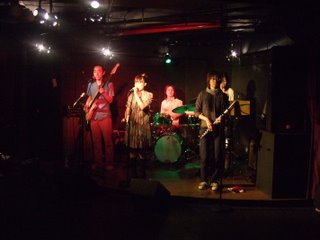
Yunn & Yuyake Lamp
Next up was
Yunn & Yuyake Lamp, which is composed of three of the four members of the defunct
Orange Plankton, a favorite band of mine that I’ve written about more than almost any group in these pages. Tonight the band had invited along a flutist and a pianist, allowing the vocalist Yunn to focus on singing rather than also playing the piano. This was as I desired—Yunn is a good pianist, but she really shines when she stands facing the crowd as a singer, crouching, jumping and dancing to create with her body the visuals to the words she’s singing.
At first after Yunn & Yuyake Lamp was formed they played all new songs, as if to emphasize they are a different entity from Orange Plankton, but recently they’ve become more comfortable looking back at their old days, and have been playing Orange Plankton tunes at shows. They did two at Saturday’s show, including “Mebuki”, the elemental, stirring finale to the album
Wakusei Note. I was also surprised and delighted to see in the audience Yuki, the former pianist of Orange Plankton.
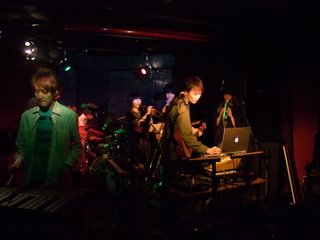
The last band,
4 Bonjour’s Parties, was the most popular with the foreigners in the audience, based on comments I got from several people during the show. And I could see how their long, mellow, chamber music-like post-rock compositions would probably be most in tune with the preferences of certain segments of mature, hip music fans. 4 Bonjour’s is a remarkable group—they have seven members, each of whom play several instruments—even the drummer sometimes switches instruments and plays the sax! The small stage wouldn’t fit them all so that some instruments, like the xylophone (!), had to be placed outside of the stage. The band is working on their first album and it would seem worth it for these guys to tour abroad when that’s done, though carrying all those instruments with them would no doubt be a logistical nightmare.
***
All through the first two acts or so I had a stomachache, brought on in part from downing two ice-cold pints of beer on an empty stomach, but also probably a result of nervousness as the organizer. Still, it was a lovely feeling to be able to introduce a few of my favorite Japanese bands to people that had never heard of them, and I want to do it again.
 Nothing extraordinary, no Toulouse-Lautrec posters, but here are a few event fliers that caught my eye at a recent show, beginning with this rather un-P.C. illustration above (do those stairs lead to the Basement Bar? Hmm, don't remember that entrance, maybe it's a side door...).
Nothing extraordinary, no Toulouse-Lautrec posters, but here are a few event fliers that caught my eye at a recent show, beginning with this rather un-P.C. illustration above (do those stairs lead to the Basement Bar? Hmm, don't remember that entrance, maybe it's a side door...).
 Flying oreo cookies, dancing licorice twists, and a path leading up to a gingerbread house...
Flying oreo cookies, dancing licorice twists, and a path leading up to a gingerbread house...
 And is that the Chinese animal that eats your dreams?
And is that the Chinese animal that eats your dreams?




 My first rightround
My first rightround 











